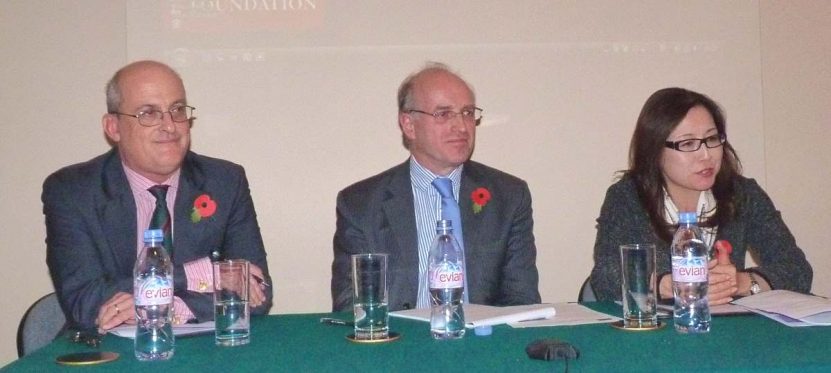 Seminar
SeminarWednesday 7 November 2012
6:00pm – 7:30pm
Military Contributions to International Stability: Since the end of the Cold War by Japan and the UK
Drinks reception from 8:30pm
Daiwa Foundation Japan House, 13/14 Cornwall Terrace, London, NW1 4QP, Nr Baker Street
Organised by Daiwa Anglo Japanese Foundation
After the end of the Cold War, international peacekeeping for military forces took on a new significance, as the end of superpower rivalry allowed suppressed regional tensions around the world to reappear with renewed vigour. In the 1990s, conflict in the Balkans challenged European and NATO countries to find ways to restore stability and similar challenges also arose in Africa. In the new millennium, particularly after the terrorist attacks of 11 September 2001, Western nations and their allies found themselves in a range of operations, from Iraq and Afghanistan to the counter-piracy operations in the Gulf of Aden and off the Horn of Africa. Both the UK and Japan have adapted their use of armed forces to meet these challenges, in the UK’s case reflecting its responsibilities for global stability as a permanent member of the UN Security Council, and in Japan’s case reflecting long-held ambitions for more permanent membership of the UNSC, which has been strongly supported by the UK. How have the two countries reacted to these challenges and what lessons can they learn from each other? This question was addressed by Professor Chiyuki Aoi, of Aoyama Gakuin University, and Brigadier Ben Barry, of IISS. A panel discussion after the presentations was chaired by Simon Chelton.
About the contributors

Brigadier Ben Barry
Brigadier Ben Barry is Senior Fellow for Land Warfare at The International Institute for Strategic Studies (IISS). In the Military Analysis Programme, he leads IISS work on land warfare, armies and current land wars including Afghanistan and Syria. He is a graduate of Sandhurst, the Army Staff College, the joint Higher Command and Staff Course and the Royal College of Defence Studies. Brigadier Barry left the British Army in 2010, after a career as an infantry officer, commanding troops at every rank from Lieutenant to Brigadier, in almost all British infantry roles and in locations diverse as Northern Ireland, Germany, France, Portugal, Canada and Hong Kong. He wrote A Cold War: Frontline Operations in Bosnia (2008) describing his battalion’s operational tour. He has been an instructor for the Army and has led Defence Diplomacy work in NATO countries, Central Asia and the Middle East. He has had various Staff appointments, which were manly in the MOD.

Dr Chiyuki Aoi
Dr Chiyuki Aoi is Professor and Graduate Programme Chair of International Politics at Aoyama Gakuin University (Tokyo). She is also a research fellow at the Research Institute for Peace and Security (RIPS). She was educated at Sophia University (BA), the University of Tokyo, the Massachusetts Institute of Technology (MS), and Columbia University (PhD). From September 2008 to September 2009, she was Visiting Fellow at the Department of War Studies, King’s College London. Her research interest is military operation and counter insurgency, stabilisation and civil-military relations in peace operations. Her main publications include Legitimacy and the Use of Armed Force: Stability Missions in the Post-Cold War Era (Routledge; Contemporary Security Studies Series, 2011). For five years she held professional positions at the United Nations High Commissioner for Refugees (UNHCR) and the United Nations University (UNU).

Simon Chelton (Chair)
Simon Chelton’s (Chair) first career was spent in the Royal Navy as a Supply and Logistics Officer, serving in ships and submarines around the world. He also learnt Japanese and spent a year at the National Institute of Defence Studies in Tokyo, in 1994/5 and served as Defence Attaché in the British Embassy Tokyo from 2003 to 2007. During this time, he coordinated with the Japanese SDF deployments in both the UK area of responsibility in Iraq in 2004, and in refuelling operations in the Indian Ocean. He also promoted enhanced cooperation in peacekeeping operations between the two countries. He left the Navy in 2009 to join the defence company BAE Systems, to support strategic engagement with Japanese defence industry, and in 2012 set up his own consulting company, Cheltons Consulting, to support the new UK/Japan bilateral agreement to collaborate in equipment development. From 2010 to 2012 he was a Director of the UK/Japan 21st Century Group, and in June 2012, his article ‘Japan’s Security: in search of new partners’ was published in the RUSI Journal.